The Many Lives of Hagia Sophia
Turkey’s Supreme Court has ruled that the famous Hagia Sophia can be converted back to a mosque. The fulfillment of this longstanding demand by President Erdogan comes at a time when populist leaders across the world have been using ethnicity and religion to distract their populations from the dire political and economic situation of their countries. Public opinion seems to be sharply polarised between those who want it to remain a museum as a testament to Turkey’s ostensibly secular character while many Muslims have campaigned for decades for this “historical blunder” to be corrected.
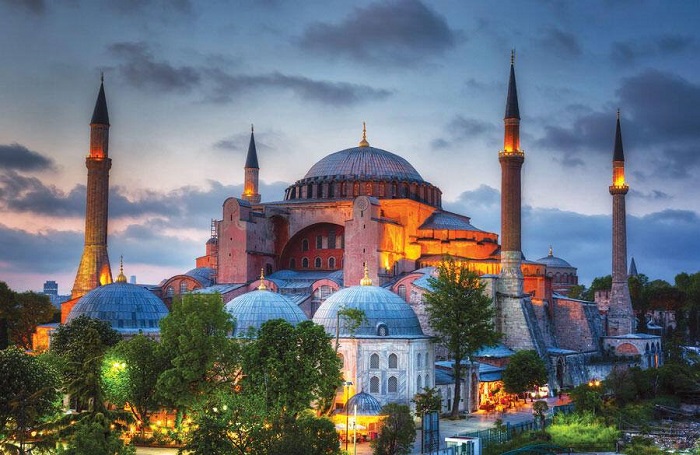
Byzantium Nunc Constantinopolis
Built by the Emperor Justinian almost 1500 years ago as a Byzantine Cathedral, Hagia Sophia or the Church of the Holy Wisdom, was converted into a Mosque by Sultan Mehmet the Conqueror in 1453. In 1934 under a secular government the mosque was converted into a museum. Now in 2020 it is being reconverted into a mosque. Unfortunately, in today’s deeply divided world it seems that this decision will widen the gulf between communities and increase mutual distrust and hate.
At a time when the world desperately needs hope and healing, this judgment will only open up old wounds. Political stances will be mistaken for intractable religious differences and as a result Christians in Turkey will suffer, as will Muslims in Europe. This conflation of politics and religion is borne out by a recent statement by Archbishop Elpidoforos of America who called the conversion of the Church as “the worst example of religious fanaticism”. He further said “by abolishing the Hagia Sophia as a monument, Turkey is closing the window that Ataturk opened to the world.”
As you can see from the Archbishop’s provocative statement the issue of the reconversion of the mosque will be painted as a problem that pits Christian against Muslim but of course history is more complicated than the binaries that we see the world in. The Christian world was deeply divided and in the throes of great tumult in 1453. The Greeks viewed the Roman Church with deep suspicion and in fact even blamed the conquest on the fact that in 1439 the Emperor John, along with the patriarch and his bishops, had travelled to Florence so that they could unify what came to be known as the Western and Eastern Churches.
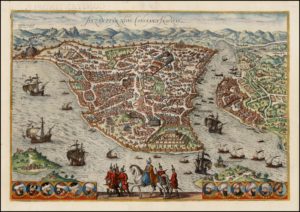
Public opinion on the streets of 15th century Constantinople was sharply divided between the unionists and those who opposed this ‘heresy.’ Doukas, a Greek witness of the conquest who worked for the Genovese, quoted his contemporary, the theologian Loukas Notaras, as saying that he preferred seeing his city under the rule of the ‘fakiolion’ or turban rather than under the ‘kaluptran’ or Latin (Pontic) veil!
In other words Greek reactions to the fall of Constantinople were mixed. Some saw it as divine providence wherein the Muslims, who allowed them to practice their religion, had saved them from the heretical Catholics who were intent on converting them. Others saw it as divine punishment for having sought to make common cause with the heretical Catholics.
As was the norm at the time, the monuments of the newly conquered city were taken over. Hagia Sophia was the most commanding symbol of the Byzantine Church and the Roman Empire and so was symbolically turned into a mosque a day after Constantinople fell. The Fatah Ar-Room or the Conquest of Constantinople was something that was foretold by the Prophet and so was an event of great significance for Muslims. Needless to say much water has flowed down the Bosporus since.
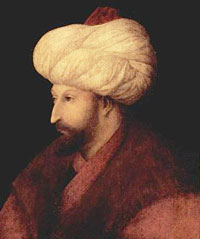
Two wrongs don’t make a right
It is important to remember that although it is easy to see history as a perennial battle between East and West, Christianity and Islam, Greeks and Turks, believers and heathens, locals and foreigners, the reality is far more complicated and for every rupture there were also continuities. The origins of the Ottoman Empire lie in this messy period of history. In today’s world where nationalism is on the ascent everywhere, the complications of history are ironed out in order to present a seamless link between past and present. In Turkey this translates into a implicit link between President Erdogan, the advocate of Ottoman revivalism and Ertugrul, the founder of the Ottoman Empire. In India the ruling party, the BJP, also draws a tacit equivalence between Prime Minister Modi and the Hindu kings of yore. Unfortunately, nationalism in all its avatars abhors the complications of history and prefers simple, neat, easily digestible binaries.
The desire to right historical wrongs can only result in an endless cycle of hate and violence as one group comes into power and another is displaced. Many Muslims see the restoration of the Hagia Sophia as an instance of righting a historical wrong. They cite the closure of the mosques in Granada and Cordoba in Spain as an example of how Europe has behaved in a similar way, as if two wrongs make a right. Others argue that the museum was only made 86 years ago and so there is justification in correcting the mistakes of a secular ‘Western’ elite who did not take into account the emotions of the majority of Muslim Turks. But then the question arises as to why the emotions of 15th century and by extension 21st century Orthodox Christians shouldn’t count? Is the logic of conquest, power and majoritarianism the only measure of what is right? Some Muslims also argue that Sultan Mohammad paid for the Church but there is scant evidence for this.
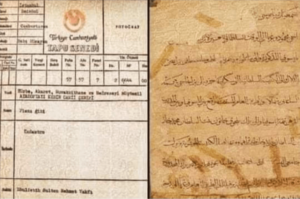
As far afield as Egypt and India old faded manuscripts and blurry pictures are being spread on WhatsApp and Facebook to spread the idea that there was a lease or sale deed of Hagia Sophia. In Turkey every year people keep claiming to have located the sale deed but most historians dispute the veracity of the story of the purchase of the Church. The government has also not put any such document in the public domain. Most people forget that until 150 years ago the conquest of objects, places or even people was seen as a legitimate assertion of ownership. After the conquest the Sultan did however create a waqf or religious trust for its maintenance with a large annual grant.
Today, the understandable and kneejerk reaction of many Muslims is to highlight the rampant and continuing Islamophobia across the world, and in particular in Europe, as well as the centuries of colonial humiliations in justifying the decision of reconverting the museum into a mosque. However, ethical positions cannot and should not be dictated out of a sense of victimhood and antagonism. In a country where Islam or Muslims are by no means under threat, this reconversion is more a symbol for religious-nationalism than an expression of faith.
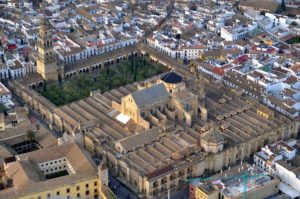
The primary catalyst for virtually all nationalisms is a sense of victimhood amongst their populations. However, to only cast oneself as victim is to always hate and never to forgive. It is to be endlessly trapped in a cycle of rage and revenge. Past and current injustices against any community- Dalit, Muslim, Hindu, Jew, Christian or Black- should never be forgotten but victimhood should not be one’s dominant identity. Infact those whose primary sense of self thrives on victimhood inevitably become oppressors. Politically these oppressors tend to be inflexible nationalists.
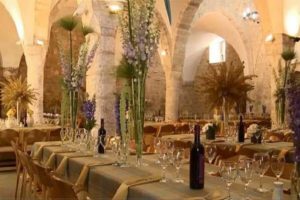
Much like nationalists who seek to differentiate between indigenous and foreigner and conjure up memories of a mythical Golden age that was disrupted by conquest, some Muslims too fall into the trap of sacralising “Muslim history.” There is every reason to be proud of the civilizational contributions of Muslim dynasties but it is worth remembering that everything, including religion, has always been subservient to the logic of power.
One of the starkest contemporary illustrations of this is the near silence of the rulers of various Muslim countries about the barbaric and inhuman treatment being meted out to the Muslim Uighurs in Southwest China. It seems trade and geo-politics trump religious solidarity let alone any notion of basic human rights. Indeed, we can see this today in Iran, Turkey and Saudi Arabia where religion and sectarianism are deployed and indeed manipulated to suit political goals.
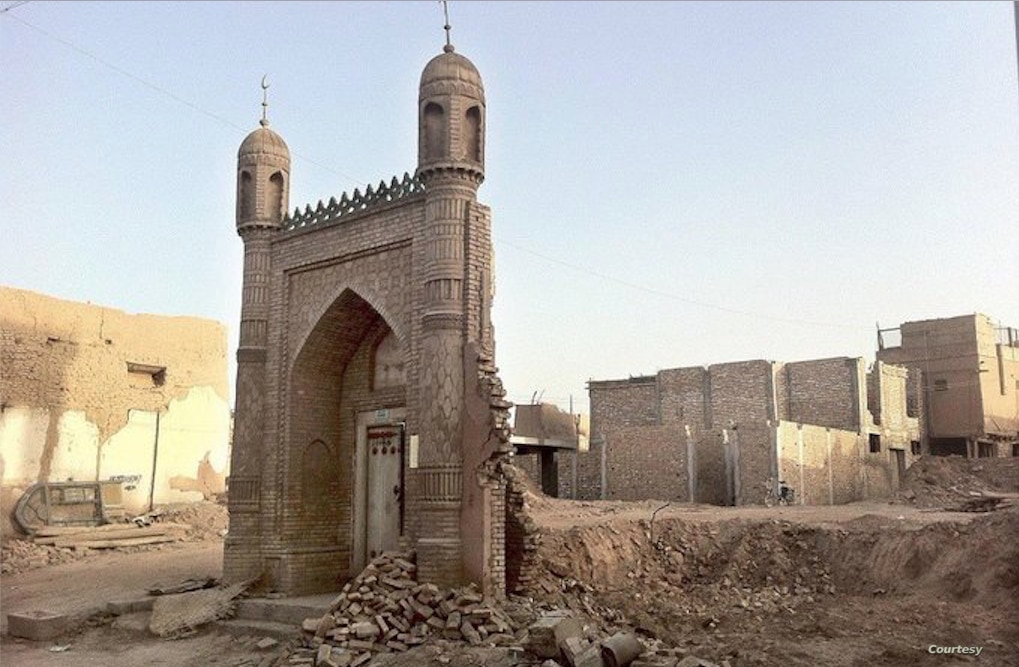
In India too, it is precisely this blind rage to correct history that has led to the ascendency of the current right wing government. The BJP propagates a sense of Hindu victimhood to justify its political and therefore thrives on exactly the same potent and lethal mix of religion and nationalism that Erdogan’s Turkey also deploys. Thus it is not surprising that many Indian Muslims, who are themselves the target of systemic and systematic repression at the hands of the BJP, feel satisfied that Muslims elsewhere, in this case Turkey, are unapologetically asserting themselves on the basis of their religious identity. However, at the risk of repetition, it is important to reiterate that it is now more important than ever to not fall prey to the conflation of religion and nationalism.
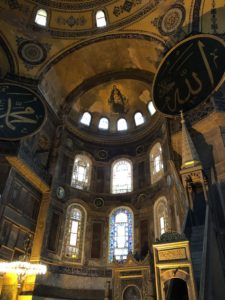
The way forward – ethics not power
The decision to reconvert Hagia Sophia must be seen as a product of the muscular religious nationalism that Erdogan espouses. It has little to do with faith although of course its proponents are Muslim. There are various Quranic injunctions that privilege dialogue, peace and reconciliation. In the 40thverse on the Chapter of Haj the Quran proclaims:
Were Allah not to check people by means of others, there would have been demolished the monasteries, churches, synagogues, and mosques in which the name of Allah is often mentioned.
Exegetes have said that this verse makes it obligatory for Muslims to defend the interests of the ahl al-dhimmah or non-Muslims citizens. The word dhimmi for non-Muslim minorities is often thrown about as a derogatory word but it quite literally means those who are protected or those towards whom Muslims have a responsibility.
Indeed, Erdogan and his colleagues would do well to recall the letter that the Prophet wrote to the Christian monks at St. Catherine’s monastery on Mount Sinai. It begins by asserting that:
This is a message from Muhammad ibn Abdullah, as a covenant to those who adopt Christianity, near and far, we are with them. Verily I, the servants, the helpers, and my followers defend them, because Christians are my citizens; and by Allah!
It then goes on to guarantee the safety of the houses of Christian houses of worship from damage or any kind of looting. This convenant was not just theoretical for the Prophet’s companions and early followers acted on this.
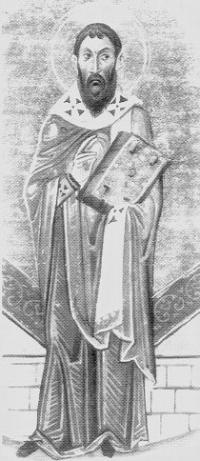
When the second Caliph Omar ibn al-Khattab conquered Jerusalem, he was greeted by the Patriarch Sophronius. At the time of prayer the Patriarch offered him a spot in the Church of the Holy Sepulcher. The Church contains two of Christendom’s holiest places: the place where Jesus was crucified and also the tomb from where he was resurrected. The Caliph, who had entered Jerusalem on a mule with just one manservant, refused to pray there saying that this might be taken as an excuse by Muslims to take over the Church. Instead he prayed in a place opposite the Church, which subsequently came to be known as the Mosque of Omar.
According to the 9th century historian Al-Tabari, the Caliph and the Patriarch also signed a covenant guaranteeing the Christians safe passage in case they wanted to leave and safety in case they wanted to stay. Five centuries later, after the fall of Jerusalem to the Kurdish Muslim leader Salahuddin in 1187, the keys of this very Church were given to a Muslim noble family who acted as custodians to make sure that no harm befell it. Today, 850 years later the descendants of Joudeh Al-Hussaini al-Ghodayya still open and close the Church every day and in doing so maintain the peace that had been guaranteed by the Caliph Omar in 637.
The point is not to argue about whether the conquest of Constantinople was right or wrong or whether Ataturk’s decision to convert the mosque into a museum was justified. Rather it is to make an ethical decision that is in consonance with Islamic principles and which takes into account the context of the world today. As has been argued, this needn’t be done out of a sense of liberal tolerance or secularism but instead ought to derive from an understanding of faith and tradition that is not distorted by the vagaries of political interests.
If indeed there is an absolute need to pray in the Hagia Sophia then perhaps part of the building could be handed over to the Orthodox Church so that they too can worship there. As Maulana Rumi, the famous 13th century Muslim mystic and poet, wrote of God reprimanding the Prophet Moses for scolding a shepherd who had dared to say that he would look after God as he did after his little lambs:
tū barā-ye vasl kardan aamadī
ne barā-ye fasl kardan aamadī
You have come to join people together
You have not come to separate them
Dr. Khan is currently an Assistant Professor at Ashoka University (India). He writes a column in Urdu for the national daily Inqilab in India and has been writing columns and editorials for various English newspapers and magazines for a number of years. Dr. Khan obtained his MPhil as well as doctorate in history from the University of Cambridge.

7 Comments
Join the discussion and tell us your opinion.
This is a very timely article and kudos for writing such a profound piece on Hagia Sophia . Truth need to be told and extremists and their thought process need to be countered irrespective of their caste and creed. Wrong should never be justified and truth should never be held back. More power to you for your take on this.
Adaab,
It’s a beautifully written article, I especially loved reading the last paragraph where you quote Maulana Rumi.
Shukriya.
This 6th century Byzantine cathedral made on the orders of Justinian, was dedicated to the wisdom of god, precisely the second person of holy Trinity. It was established as a Basilica and for almost 1000 years it has remained sacred for the Christians of Turkey and the world. If only it was so important to convert it into a mosque, Maulana Rumi should’ve said something about it. Turkey’s current leadership has done a ‘historical blunder’ once again by making a mosque out of the building that was meant to be a church. The abode of Rumi should’ve shown love for the minorities living there.
Its an interesting read.
Says how much we share politically and fanatically with Turkey.
Absolutely if part of the building they would have handed to the church so that they too can worship there , it would have been the best decision to fill the gap between two religions
Awesome.Very well written and gives a good insight in the labyrinth of Middle Ages. Kudos
Insightful article and well propounded!Those of us who have been fortunate to have been able to visit this exquisite monument will hope that it will remain open to all.If only we in India could follow the wonderful legacy of Mustapha Kemal Pasha